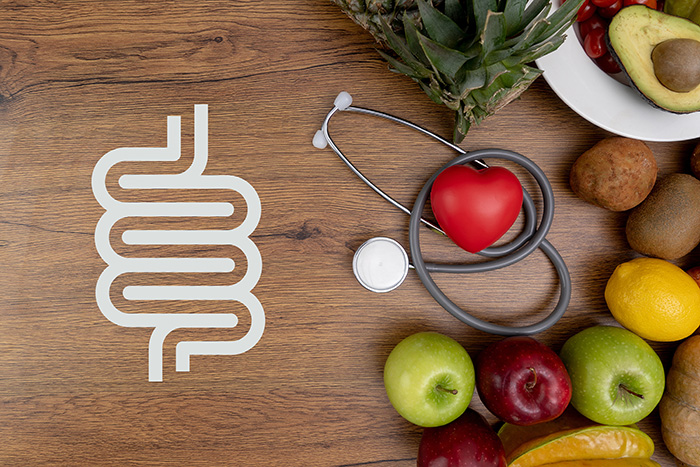Could Food Be Medicine?

There is immense potential for preventing and treating common gastrointestinal (GI) ailments, such as reflux and bloating, by using food as medicine, according to a paper authored by University of Miami Health System gastroenterologists.
“In health care, a lot of what we do is treat symptoms,” says Michelle Pearlman, M.D., a gastroenterologist and co-author. “I often feel that a lot of my practice is dedicated towards managing symptoms or diseases and less on preventing them in the first place. Health care should really be about promoting health and preventing sickness.”
The paper, published in the American Journal of Gastroenterology in December 2020, was written by Dr. Pearlman, Andres F. Carrion, M.D., and Justin J. Forde, M.D.
It discussed an evidence-based approach using lifestyle and dietary modifications to manage upper GI conditions, which are easy to implement in clinical practice, they wrote.
Food can cause GI symptoms

Often, GI symptoms happen because of how and what people eat and drink; not because there is something structurally wrong with their bodies.
The scenario is similar to what happens when a patient takes a drug and experiences a drug-related side effect. If the patient stops taking the drug, the side effect likely will go away. A similar behavioral change should occur when a food or eating behavior causes GI distress, like bloating, upset stomach, or reflux.
“What we tend to believe are normal eating behaviors based on social and cultural norms is often very far from normal,” says Dr. Pearlman. “When we go out to eat, we eat portions that are two, three, four times a serving and then feel bloated or run to the bathroom and have diarrhea. We blame our bodies for turning against us, but many times the food, artificial chemicals, and large portion sizes are really the culprit. We also tend to practice certain eating behaviors that can increase excessive air swallowing like talking while eating or consuming carbonated beverages.”
Doctors should obtain individual, cultural, socioeconomic, and behavioral information from patients. That way, they can provide a more personalized dietary and lifestyle modification plan for those experiencing GI symptoms, according to the paper.
Patients with GI symptoms should create manual or electronic food diaries, which include documenting when their symptoms occur and what those symptoms are.
“The food diary is incredibly helpful. It allows physicians to look for patterns and make personalized recommendations based on those correlations,” Dr. Pearlman says.
Some common behaviors can cause upper GI symptoms
“It is not just about what we are eating, but also how we are eating,” she says. “If we inhale our food during our lunch break and we feel bloated, it may have nothing to do with the actual food that we ate. It may just be that we ate so fast that we excessively swallowed air.”
As an example of common misconceptions, Dr. Pearlman offers ginger ale for soothing an upset stomach.
“One of the complaints that I get is bloating. Sometimes, it is because patients are chugging tons of ginger ale, thinking it will help their symptoms,” she says.
“Fresh ginger can be used as a smooth muscle relaxer and can help some patients with intestinal cramping or stomach upset. But ginger ale often does not contain real ginger. All it has is high sugar content and bubbles. That makes us belch, and we think the soda is helping relieve the gas. When, in fact, the belching is from the soda we just consumed.”
The goal for all health care providers should be to incorporate dietary and lifestyle counseling as first-line therapy. They should only resort to pharmaceuticals when a patient’s symptoms are severe or do not improve with more conservative measures, the authors wrote.
Dr. Pearlman and her colleagues are designing a study that will look at patients hospitalized with Crohn’s disease and ulcerative colitis.
The researchers are creating an anti-inflammatory menu and will evaluate whether the consumption of anti-inflammatory foods and the elimination of foods that promote inflammation have an effect on symptoms.
Originally written by Lisette Hilton for Inventum. Adapted for UMiami Health News.
Tags: Crohn’s disease, Dra. Michelle Pearlman, gastrointestinal, nutrition in miami
